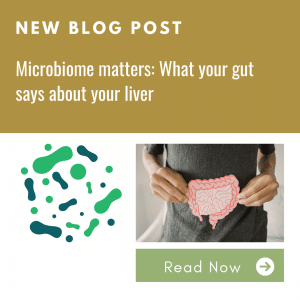
Did you know that the tiny organisms living in your gut, called the microbiome, can have a strong impact on your liver? Recent research shows that the bacteria and fungi in your digestive system play a major role in keeping your liver healthy and may even affect how hepatitis B progresses.
The gut-liver connection
Your gut and liver are closely connected through something called the gut-liver axis. When your gut microbiome is balanced, it helps protect your liver by producing helpful substances such as butyrate and tryptophan. These can reduce inflammation and support liver function. But when the microbiome is out of balance (a condition called dysbiosis), harmful bacteria and toxins can leak into the bloodstream and reach the liver, causing damage (Zhang et al., 2024).
What happens in hepatitis B
Hepatitis B virus (HBV) can lead to serious liver problems, including cirrhosis. A 2025 study found that people with HBV-related cirrhosis had fewer good bacteria such as alistipes and lachnospira, and more harmful ones including Fusobacterium and Enterococcus in their gut (Chen et al., 2025). These changes were linked to lower levels of important nutrients like tocopherol, which help protect the liver.
Another study looked at how the mix of bacteria in the gut changes as hepatitis B gets worse. Researchers found that people with chronic hepatitis B had a wider variety of bacteria compared to people without hepatitis B. They also noticed changes in the balance between two major groups of bacteria (firmicutes and bacteroidetes) that are important for digestion and immune health. These shifts in gut bacteria could help doctors understand any changes or advances in hepatitis B and possibly even predict how it might develop over time (Wang et al., 2023).
Bile acids and bacteria
Bile acids, which help digest fats, also interact with gut bacteria. In HBV-related liver disease, high bile acid levels were linked to more lactobacillales and fewer clostridiales, which suggests another kind of imbalance (Zhou et al., 2025). This connection could lead to new treatments that target both bile acids and bacteria.
Your gut microbiome does a lot more than help you digest food. It’s deeply connected to your liver and can influence how hepatitis B develops and changes over time. As scientists learn more, we may see new treatments that focus on fixing the microbiome to protect and promote liver health.
References:
Chen, Y., et al. (2025). Gut microbiota and metabolomic profiles in HBV-related cirrhosis. Journal of Hepatology Research.
Li, X., et al. (2024). Gut mycobiome and liver disease: Emerging insights. Liver International.
Wang, J., et al. (2023). Microbiota diversity across HBV disease stages. Microbiome Medicine.
Zhang, L., et al. (2024). Gut microbiota and chronic liver disease: Mechanisms and interventions. Hepatology Reviews.
Zhou, H., et al. (2025). Microbiota–bile acid crosstalk in HBV-induced cirrhosis. Clinical Gastroenterology.

